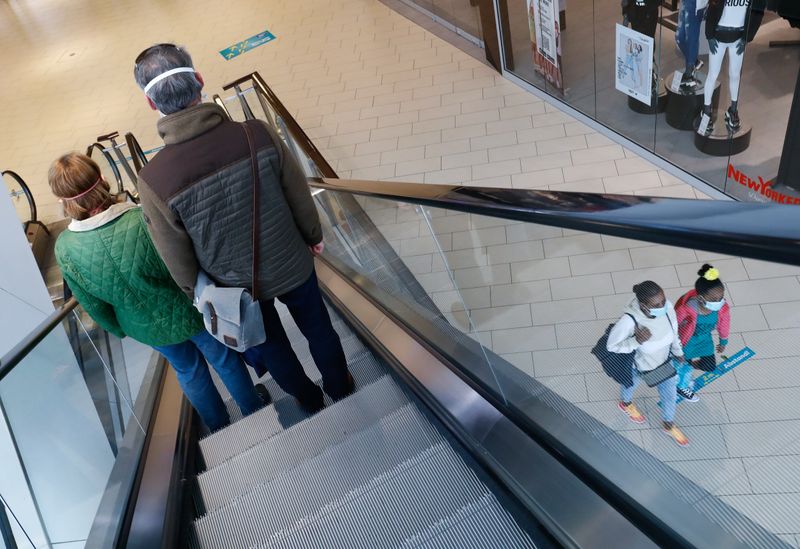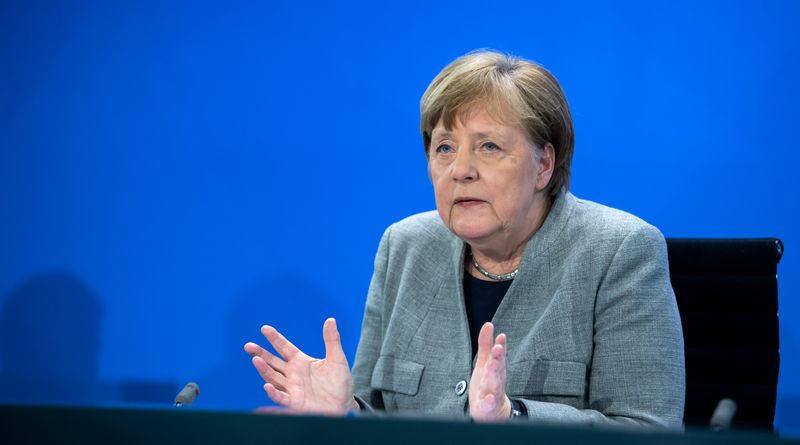By Andreas Rinke and Micha Serr
BERLIN/FRANKFURT (Reuters) - Germans returned to the shops on Monday, craving retail therapy after a month of lockdown, but Chancellor Angela Merkel urged them to remain disciplined to avoid a relapse in the fight against the coronavirus.
Shops up to 800 sq metres, as well as car and bicycle dealers and bookstores, are allowed to reopen this week under an agreement with the leaders of Germany's 16 states, all keen to start the long haul of pulling the economy out of recession. Schools are set to begin reopening in two weeks.
Europe's largest economy has relied more on domestic demand in recent years as the strength of its traditional export engine has faded, and the move echoes a slow easing in neighbouring countries, equally desperate to revive business and society.
"We need life again. This whole time it was like a ghost town," said Michaela Frieser, not wearing a face mask, in Frankfurt's main shopping district. "The sun's out, we saved enough money and now we need to go out and spend it!"
The federal and state governments have strongly recommended that Germans wear face masks when shopping and on public transport, and some states have even made that compulsory.
Gertrude Sietzy, wearing a face mask and disposable gloves nearby, was thrilled to get outside.
"I don't like ordering on the internet," she said, adding that, if shoppers kept their distance, "it should work".
To the east, farmers' markets, craft shops, car dealerships and dog grooming salons opened in the Czech Republic, which had imposed one of Europe's earliest and strictest lockdowns.
"This is relief from the stress that we will have to throw away the harvest," vegetable grower Milan Vystejn said at his stand in Prague's Tylovo Square (NYSE:SQ).
Germany's southern neighbour Austria took a first step in relaxing restrictions last Tuesday by letting DIY stores, garden centres and smaller shops reopen, and plans to reopen museums and libraries from mid-May.
SPLIT CLASSES
To the west, Luxembourg said a similar selection of stores could reopen, and that schools would begin reopening from May 4, starting with final year pupils taking exams. But when all schools reopen, classes will be split into two halves that each alternate between a week in school and a week studying at home.
Merkel told officials from her Christian Democrats (CDU) that the danger of infection remained high in Germany, after weekend sunshine drew many into parks.
She told reporters it would take 14 days to see if the easing was pushing up the infection rate, adding: "We must remain vigilant and disciplined."
There was a risk that contagion would surge if the restrictions were eased too fast, and then they would have to be tightened again, Merkel said.
Germany has the fifth highest COVID-19 caseload behind the United States, Spain, Italy and France, but has kept fatalities down thanks to early and extensive testing, and has only a third of the deaths of New York city alone.
Its total of confirmed cases rose by 1,775 to 141,672 on Sunday, the second consecutive day that the number of new infections had fallen.
The death toll rose by 110 to 4,404, the tally from the Robert Koch Institute showed.
The gradual easing provides for social distancing rules to remain in place until May 3. Schools will start opening from May 4, with priority for final-year students. Hairdressers can also reopen then. The group will meet again on April 30 to review how to proceed after May 3.
The Germany economy is now in a severe recession, according to the central bank, the Bundesbank, which said recovery was unlikely to be quick as many coronavirus restrictions could stay in place for some time.

The government has tried to cushion the economic effect of the shutdown with measures including a 750 billion euro ($815 billion) stimulus package.
